THUNDER BAY – Leaders at the Northern Ontario School of Medicine (NOSM) say the institution’s new strategic plan will deepen its commitment to social accountability and serving the needs of people in the north.
The launch of its new plan, entitled The NOSM Challenge and setting a blueprint through 2025, included frank acknowledgements of the need to confront racism and other inequities in the health care system.
Over 260 people joined the virtual launch event Tuesday morning, including Thunder Bay-Rainy River MP Marcus Powlowski and Nickel Belt MPP Frances Gelinas.
Leadership at the school, which has campuses at Lakehead University in Thunder Bay and Laurentian University in Sudbury, focused on NOSM’s social accountability commitment and the need to address shortages of doctors and other health professionals in northern Ontario.
Strategies to address shortages will include advocating to expand NOSM’s class size to accept more students, and increasing the focus on “rural generalist” pathways to encourage graduates to practice as family doctors in smaller communities.
Dr. Alexandre Anawati, a charter class graduate and NOSM board member, outlined the health inequities particular to northern Ontario, which include rates of addiction, mental health challenges, and chronic disease markedly higher than provincial averages
Those could be traced not only to geography but to social issues like lack of access to clean drinking water, healthy food, and adequate housing that are particularly acute in remote communities, he said, underlining the need for the school to consider social determinants of health in its curriculum.
Anawati praised NOSM as the first medical school to be founded on an explicit social responsibility mandate. That approach should be a model for the health system at large, he argued.
“Health needs are the right of everyone, not just the privilege of a few,” he said.
The school’s dean, Dr. Sarita Verma, said recent events including the death of Joyce Echaquan and revelations of abuse and neglect in long-term care homes had put a greater spotlight on inequities in the health system.
The school had an obligation to acknowledge and address issues like racism in health care delivery, she maintained.
“In every case, NOSM will be prepared to speak up when we see inequity,” she said. “We are going to face racism head on… The case of Joyce Echaquan should never happen in northern Ontario.”
Dr. Sarah Newberry said the school strives to ensure health practitioners, including the school’s 1,700 faculty working in the health care system, learn to view their work through a “cultural safety lens” that takes into account the experiences of Indigenous people with the health care system.
Verma also pointed to the school’s creation of a new associate dean position responsible for equity and inclusion, recently filled by Joseph Leblanc, and a relatively high percentage of Indigenous and francophone students.
The school also launched an accompanying NOSM trivia challenge Tuesday, in which participants can win $1,000 and play for a northern Ontario community to help win a $10,000 donation to a local health centre. The challenge runs until Jan. 12.
